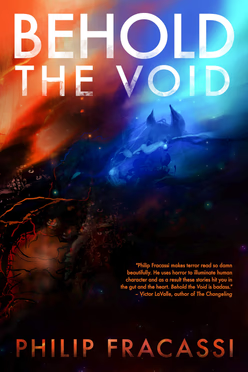Altar

I struggle to remember the last time a story evoked such a visceral sense of dread. Both Chuck Palahniuk’s “Guts” and Bret Easton Ellis’s American Psycho had scenes that forced me to stop reading, but “Altar” is different.
The story concerns a mother, Martha, and her kids, twelve-year-old Gary and fifteen-year-old Abby. A summer day finds the three en route to the community pool in the family car. The opening thrusts us into Gary’s anxious point of view:
The grill of the white Cadillac trailing behind them twinkled in the heat, the chrome glinting like a metal mouth bearing down on the rear bumper every time the brakes squealed them to a stop.
My lone nit lies here, as it wasn’t until they arrived at the pool that Fracassi reveals Gary’s age. During the car ride, I pictured him as seven or eight, not twelve. A minor quibble, but why pin the age of either sibling? Between Gary’s thoughts and the perfect detail of Abbey scribbling love letters in bright green ink to her teenage crush, we know enough. But I digress.
Back to the story. Once we arrive at the pool, it introduces another point of view, young Tyler, who’s almost old enough to graduate from his floaties. Fracassi imbues both Tyler and Gary’s perspectives with the anxieties, frustrations, and simple joys of childhood. They never feel cloying or contrived.
Kids splashed mercilessly around him but he didn’t mind, part of him actually grateful now for the wings that kept him easily aloft, although he’d never admit it to his mother.
As Tyler floated out into the pool’s deeper waters, I noticed a slight weight on my chest, as though I were laying down and resting a cold can of soda on my sternum. As Gary noticed Abby arguing with two older boys, the can of soda became a six-pack. As Gary sees his sister dragged away, the six-pack became a case. Part of me wanted to stop reading. A larger part thrilled at the reaction.
I won’t spoil the end, as I need not write about it to remember. Suffice to say Fracassi delivers a Lovecraftian commentary on lost innocence that smothered me like a wave of nihilistic horror. This story, I won’t forget.
Reading History
- 2022Apr18MonKindle (Behold the Void, Lovecraft eZine Press, 2018)